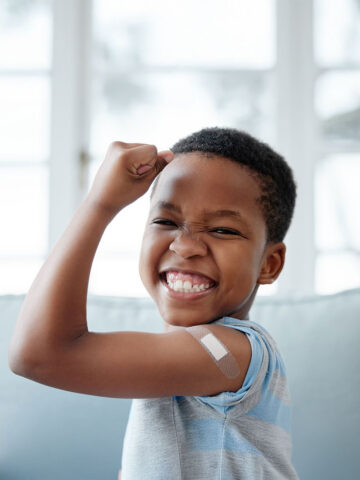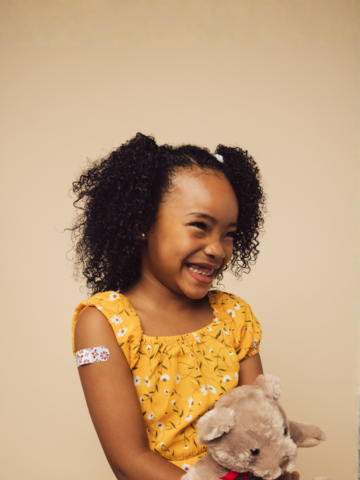What to do when your baby is sick with a respiratory virus
Having a sick baby can be incredibly scary for parents. If your baby has a cold, flu, COVID-19 or respiratory syncytial virus (RSV), you may understandably have questions about which treatments are OK for babies, how to make them more comfortable and when to call the doctor.
First, take a breath. You are at the right place! You are the fierce protector of your child, and we are here to help.
Dr. Reshmi Basu, a CHOC pediatrician, offers the following advice for parents of babies with a cold, flu, COVID-19 or RSV.
Watch for signs of respiratory illnesses in babies
Dr. Basu recommends that parents watch for the following signs of colds, flu, COVID-19 and RSV in babies.
Possible symptoms of colds, flu, COVID-19 or RSV in babies
| Symptom | Cold | Flu | COVID-19 | RSV |
|---|---|---|---|---|
| Fever/chills | X | X | X | X |
| Congestion | X | X | X | X |
| Runny nose | X | X | X | X |
| Sneezing | X | X | ||
| Sore throat | X | X | X | X |
| Headache | X | X | X | X |
| Cough | X | X | X | X |
| Nausea/Vomiting | X | X | ||
| Fatigue (extra sleepy/tired) | X | X | ||
| Muscle/Body aches | X | X | ||
| Diarrhea | X | X | ||
| Wheezing | X | |||
| Severe Cough | X |
Since your baby can’t tell you how they feel, the following additional signs might help show that your baby is sick with a respiratory virus:
- Fever.
- Unusual tiredness.
- Irritability.
- Trouble nursing or taking a bottle due to congestion.
- Difficulty sleeping.
- Decreased appetite.
- More frequent crying.
Additional signs of RSV in babies
The early phase of RSV in infants and young children is often mild, like a cold. In children younger than 3 years, the disease may progress into the lower airways and cause coughing and wheezing. In some, the infection progresses to a severe respiratory disease requiring hospitalization to help the child breathe. Look for possible signs of severe RSV in babies:
- Apnea (periods without breathing).
- Trouble eating, drinking or swallowing.
- Wheezing.
- Flaring of the nostrils or straining (contractions) of the chest or stomach while breathing.
- Breathing faster than usual, or trouble breathing.
See the following video from CHOC for more signs of RSV in babies.
When should I seek help for my baby’s respiratory virus?
If your baby is showing symptoms of illness, contact your pediatrician or a healthcare professional, says Dr. Basu. They can provide guidance based on your baby’s specific symptoms and medical history.
Call CHOC’s free, 24/7 nurse advice line at 844-GET-CHOC (844-438-2462) for additional help and peace of mind.
Call your doctor right away if your baby:
- Is less than 2 months old and has a fever.
- Has a fever of 100.4 degrees or higher lasting more than three days.
- Has labored breathing including wheezing, fast breathing or shortness of breath.
- Is dehydrated along with not eating or drinking.
- Feels constant ear pain.
Visit the emergency department if your baby:
- Is less than 28 days old with a fever of 100.4 or more.
- Has severe difficulty breathing.
- Is showing significant changes in their mental state like decreased activity and alertness.
- Cheeks, lips, tongue and inside of mouth appear bluish, indicating that your child may have low oxygen.
How to help your sick baby with a cold, flu, COVID-19 or RSV feel better
Follow medication guidelines
Do not give cold or cough medicines to children under 6 years old because they can cause bad reactions. If your doctor prescribes recommended medications, follow the dosing instructions carefully. Never give your baby medications without consulting your doctor first.
Provide comfort and hydration
Ensure your baby gets plenty of rest and stays hydrated. If your baby is breastfeeding, continue to nurse frequently. For formula-fed babies, offer formula as usual. If your baby is over 6 months, you can also offer small sips of water.
Watch for signs of dehydration like a dry or sticky mouth, little or no tears when crying, fewer than six wet diapers per day or a sunken soft spot in the infant’s head. If you spot any signs of dehydration, call your doctor.
Use a humidifier
Using a cool-mist humidifier in your baby’s room can help ease congestion and make breathing more comfortable. Make sure to clean the humidifier frequently to prevent mold from forming.
Keep the nose clear
Put a few drops of saline (salt water) into your baby’s nose, then gently suction the mucus out with a bulb syringe.
Do this no more than two to three times a day so that the inside of your baby’s nose does not get swollen or sore.
Elevate the head
Elevate your baby’s head slightly while sleeping to help with breathing. You can do this by placing a rolled-up towel under their mattress. Make sure to monitor your child while sleeping this way, and ensure the elevation isn’t more than a 30-degree incline to prevent your baby from rolling over.
Allow time to recover
Keep your baby home from childcare to allow time for them to recover, and to prevent spread.
How to prevent your baby from getting sick
Because your baby’s immune system is still developing, it’s common for parents, siblings or other family members to bring home viruses to your baby. Wash your hands frequently to prevent the spread of germs.
Avoid close contact with your baby if you are sick and encourage friends and family to do the same, especially during cold and flu season. Make sure that your baby — and all eligible members of your household — have gotten their flu vaccines and COVID-19 vaccines to prevent illness from spreading. Ask your pediatrician if your baby is eligible for the new RSV vaccine.
Remember, it’s crucial to consult with a healthcare professional for personalized advice based on your baby’s health status. You know your baby best! If your baby shows severe symptoms or you’re concerned about their well-being, seek medical attention from your doctor or nearest emergency department.
For more health and wellness resources from the pediatric experts at CHOC, sign up for the Kids Health newsletter.
Find a CHOC Primary Care Pediatrician
From babies to teens, pediatricians from CHOC’s Primary Care Network partner with parents to offer immunizations, sick visits, sports physicals and more.





